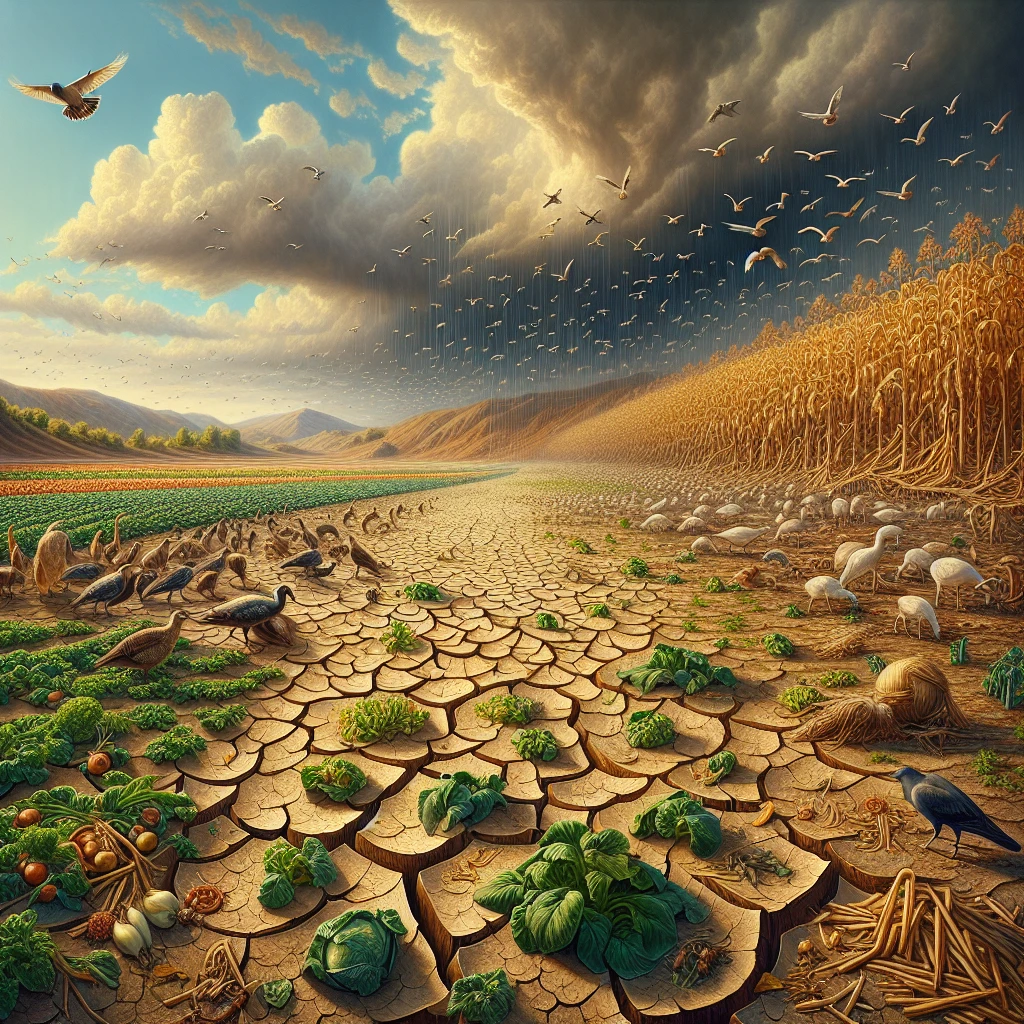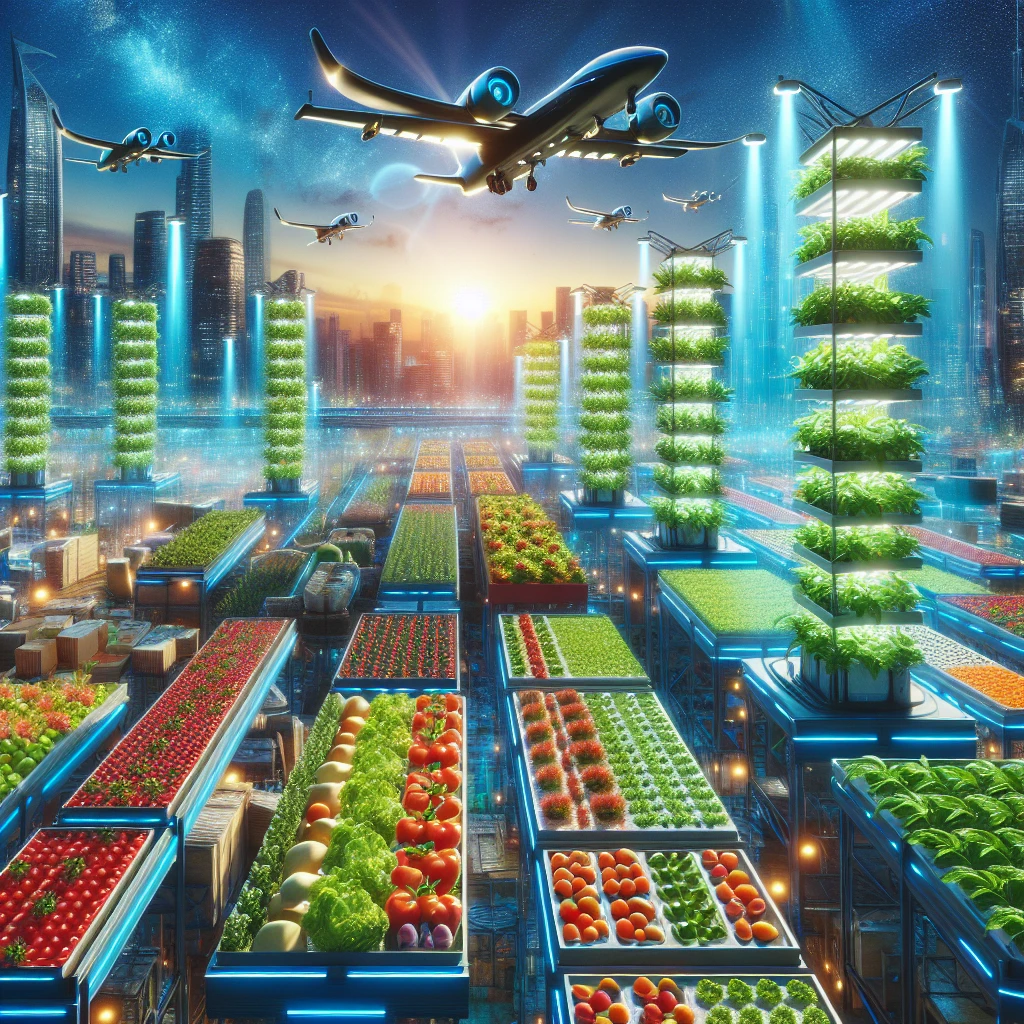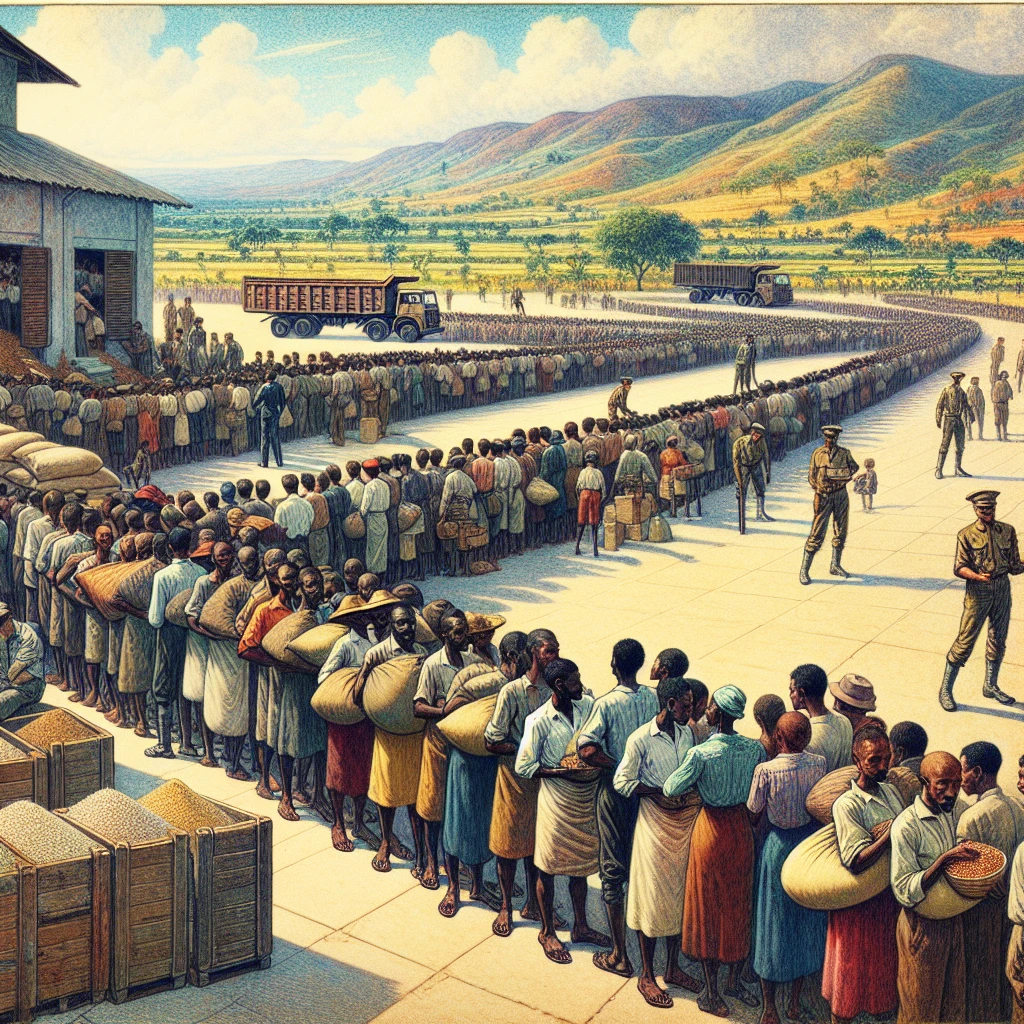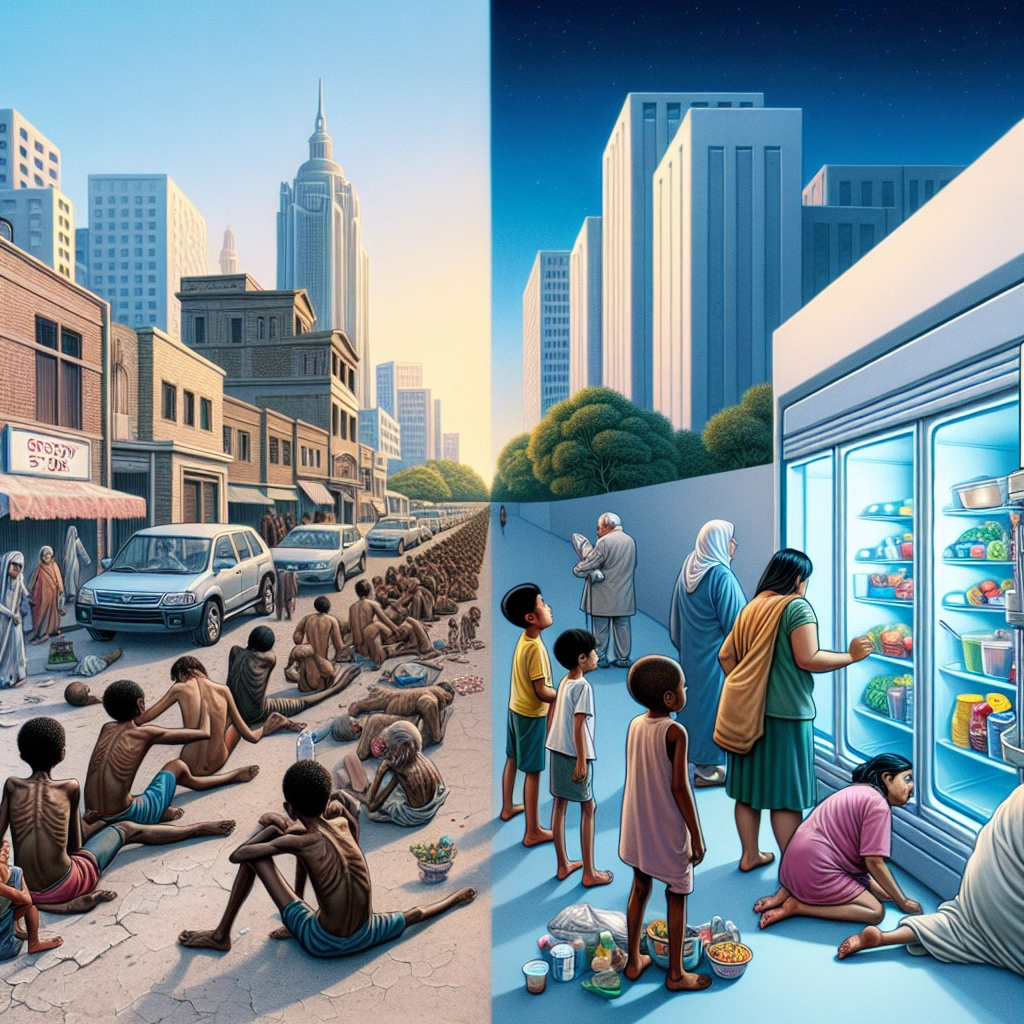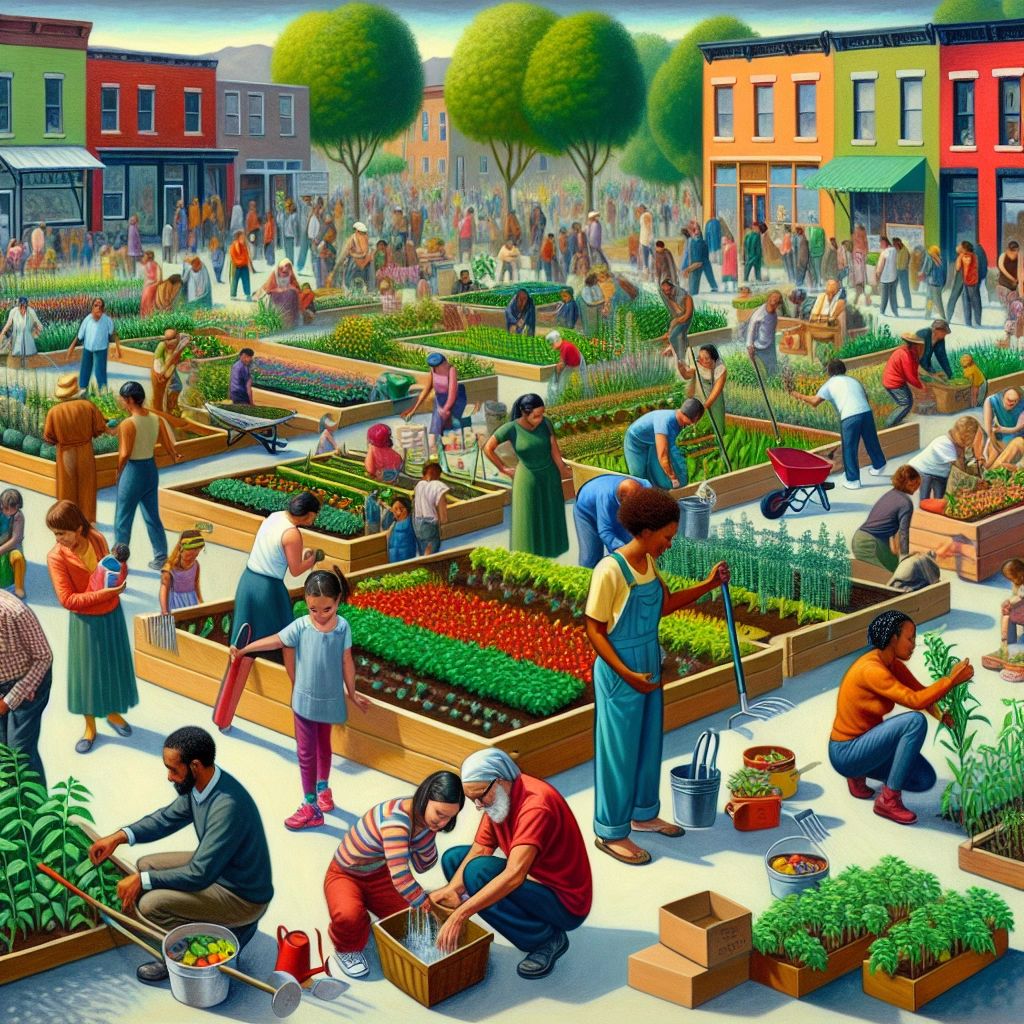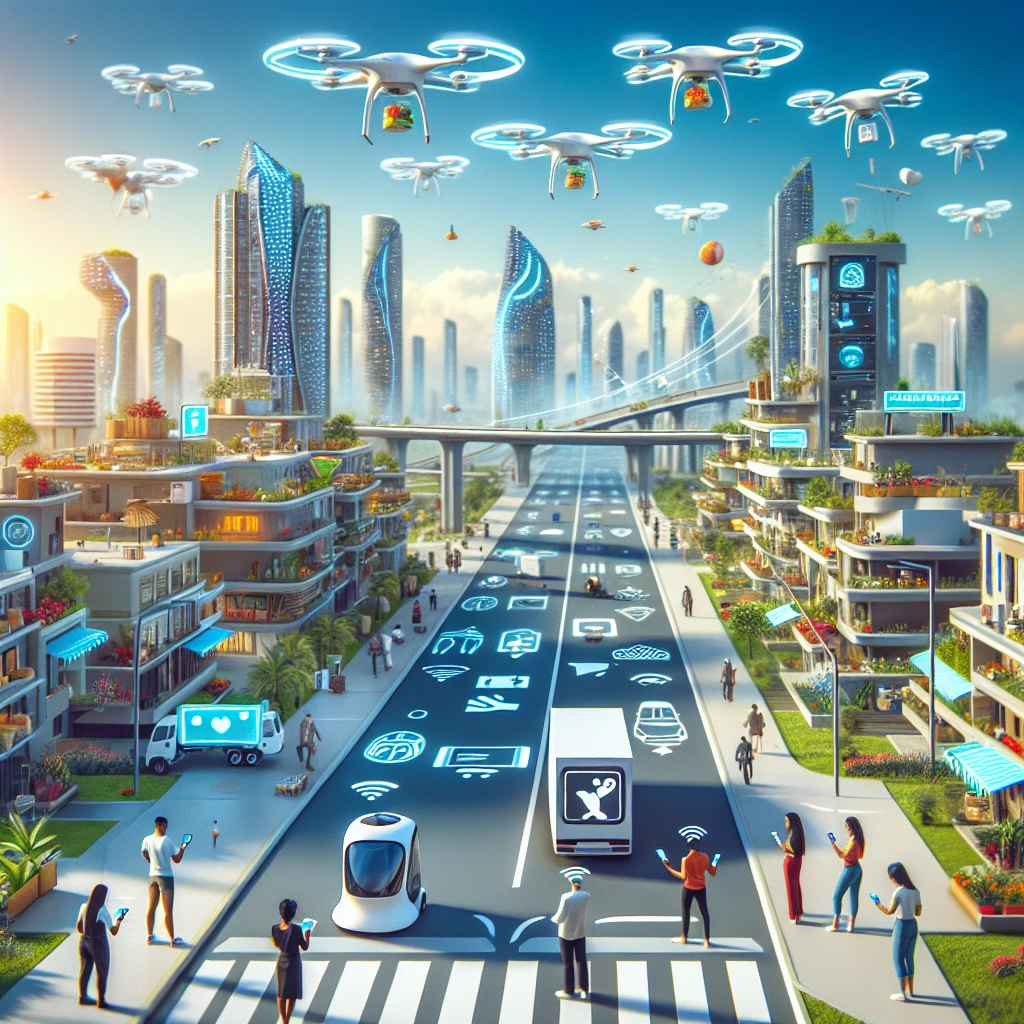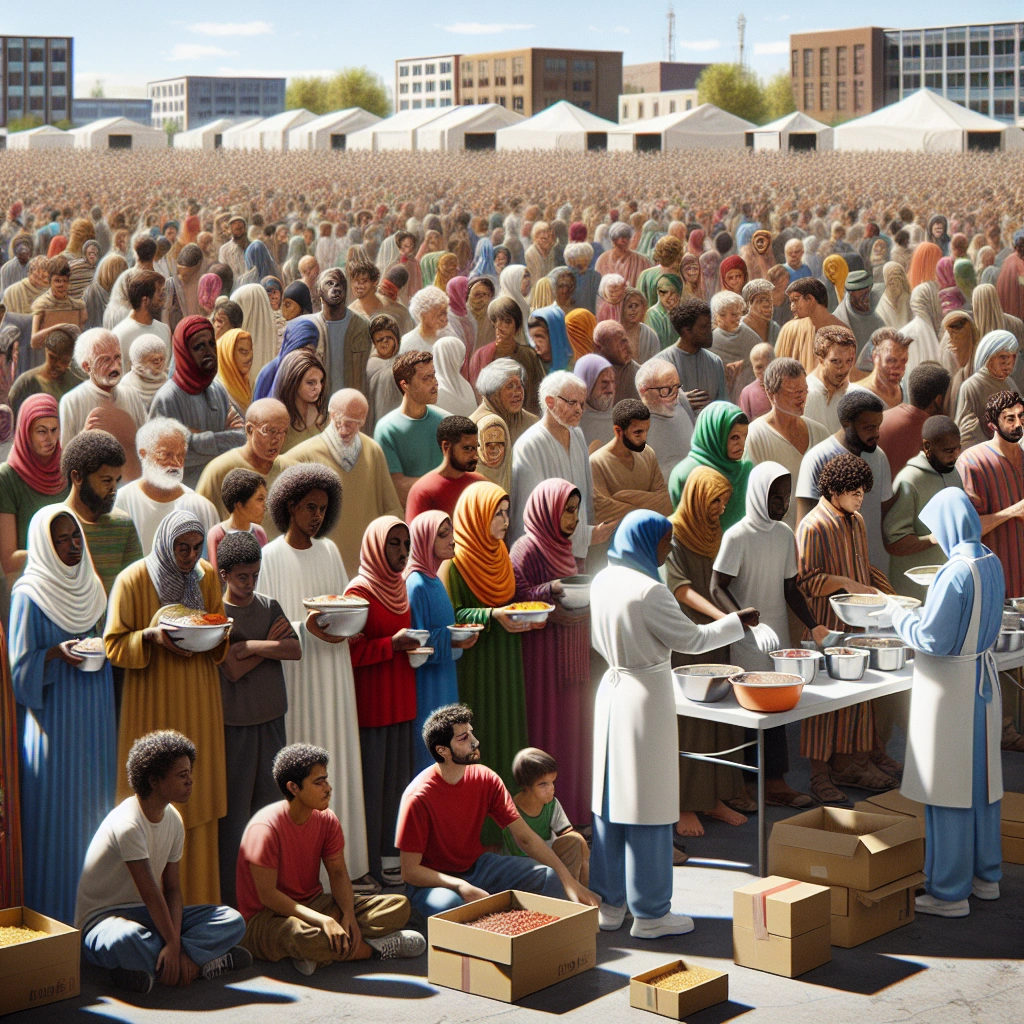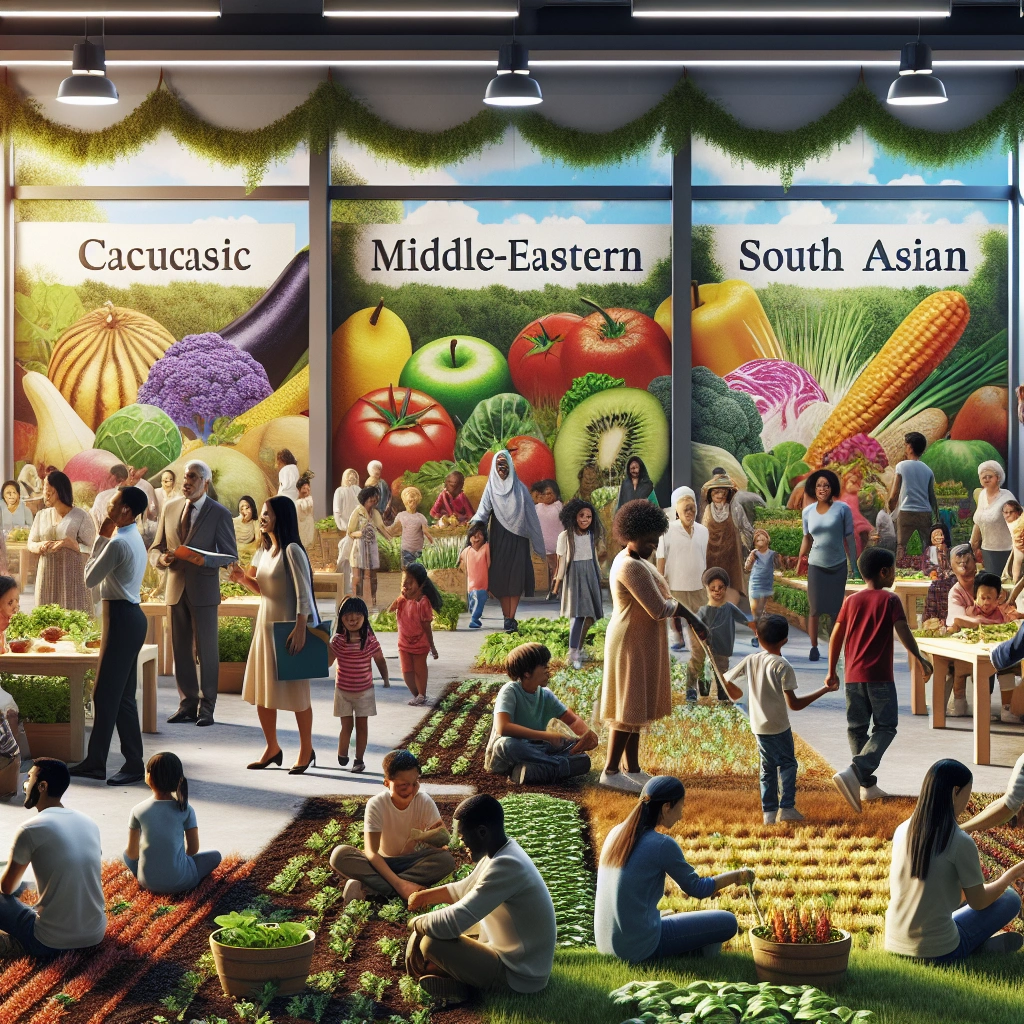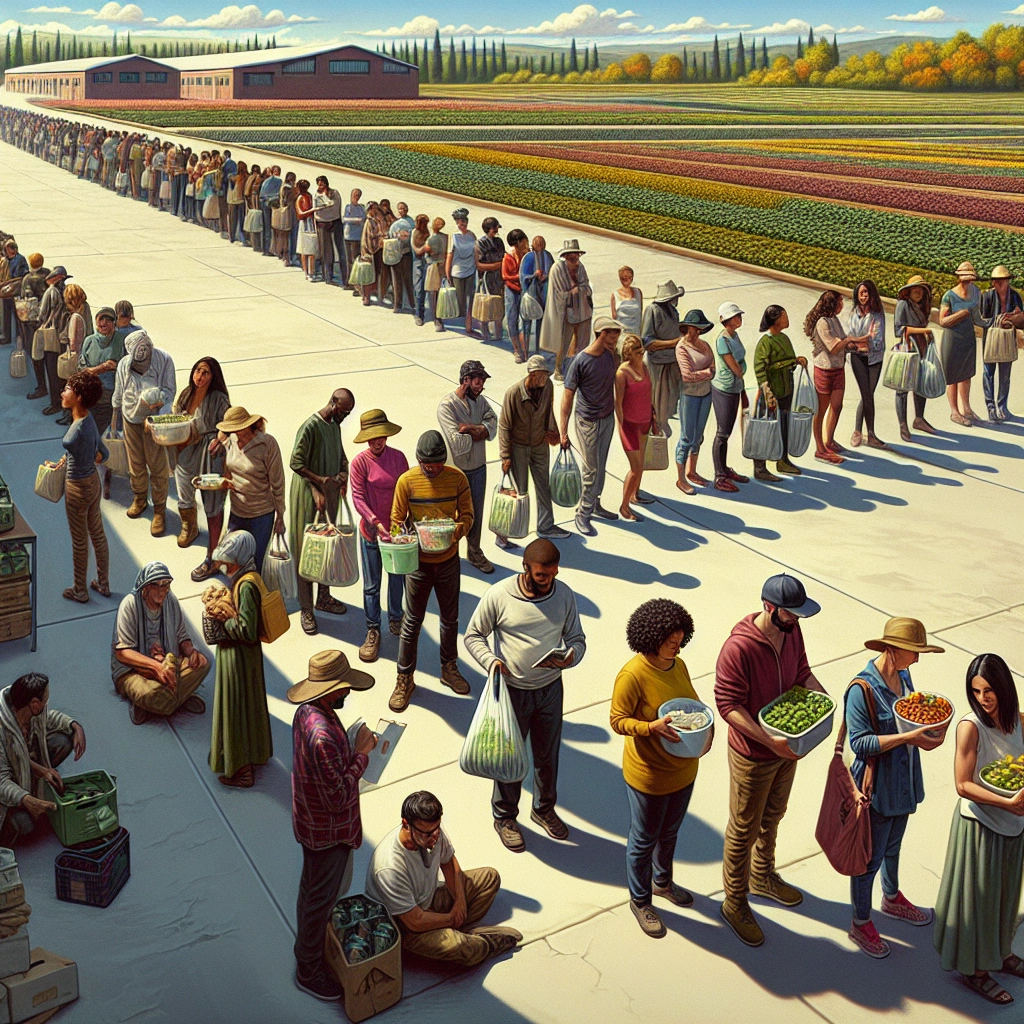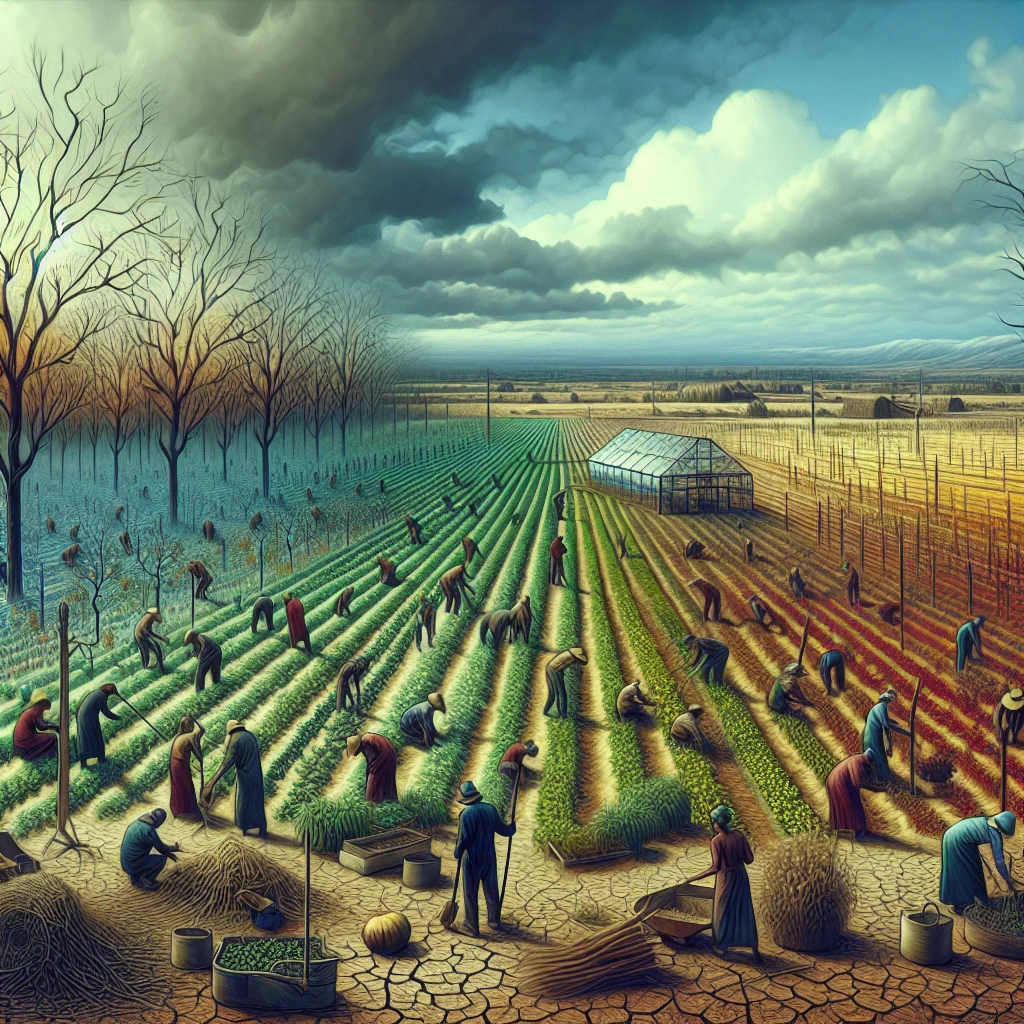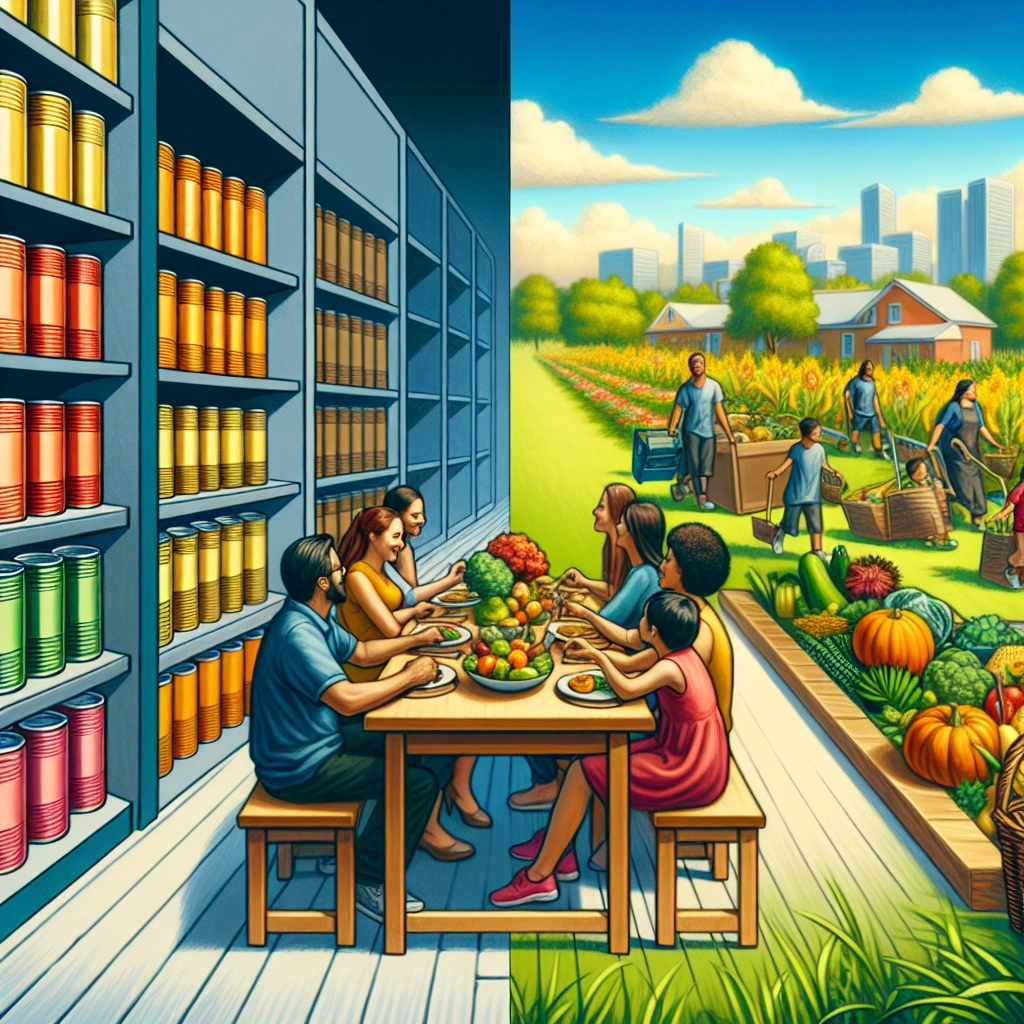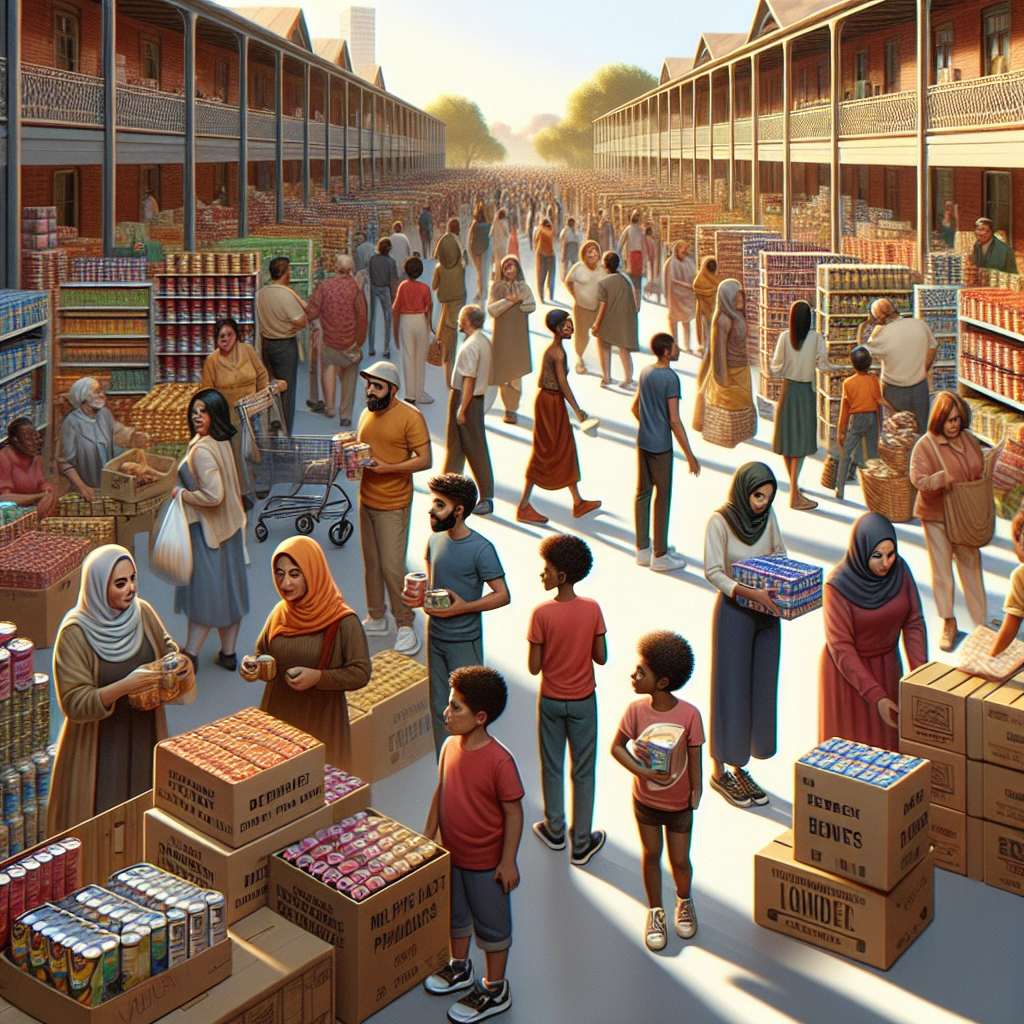

The food shortage crisis in 2024 has reached severe levels, impacting the global food supply and distribution. Inflation rates higher than 5% are being experienced in a significant number of low-income, lower-middle-income, upper-middle-income, and even high-income countries, leading to widespread food price inflation.
The number of people experiencing acute food insecurity is on the rise, with over a quarter of a billion people facing acute hunger, due to economic shocks, regional conflicts, and the Ukraine war contributing to the increase in food insecurity.
Check out this Youtube video: “2024 FOOD SHORTAGES | Stockpile These Foods NOW!” for crucial information on preparing for potential food shortages in 2024.
The Root Causes of Food Shortage 2024
The increasing impact of climate change poses a significant threat to agricultural productivity. With rising temperatures and erratic weather patterns, crop yields are at risk of decline, directly impacting food availability.
For instance, extreme weather events such as droughts and floods can devastate crops, leading to food shortages. This phenomenon has been observed in regions like the Horn of Africa, where the worst drought on record has been exacerbated by climate change, making it impossible to achieve sustainable agricultural production.
Political and economic instability play a pivotal role in disrupting food supply chains globally. Instances of unrest, civil commotions, and protests can result in public disorder, leading to damage and theft within the food distribution network.
Additionally, global supply chains are also vulnerable to impact from geopolitical instability and conflicts, leading to delays in delivery and re-routing of resources. For instance, the shift to leaner, more efficient global sourcing strategies is impeded when political unrest strikes, thereby disrupting the food supply.
| Country | Impact of Political Instability on Food Supply |
|---|---|
| DRC | Riots and damage to food distribution networks |
| Afghanistan | Public disorder leading to theft and shortages |
| Yemen | Disruption in food logistics due to political unrest |
| Syria | Impact on food supply due to ongoing conflicts |
The convergence of climate change-induced agricultural challenges and political and economic instability creates a breeding ground for the imminent food shortage in 2024, necessitating proactive measures to mitigate its far-reaching consequences.
Impact on Global Food Security
The threats to nutrition and health in developing countries are alarmingly high. Malnutrition remains a significant risk factor, directly contributing to approximately 300,000 deaths in these regions.
Women and girls are particularly vulnerable due to systematic discrimination, often being deprived of adequate nutrition, further exacerbating the issue.
The potential for civil unrest and migration due to the scarcity of food resources is a growing concern. Rising food insecurity triggers social and political unrest, as evidenced in the global food crisis of 2007-2008, which led to food riots and political instability in 48 countries.
Moreover, environmental scarcity and conflict outbreak have a direct correlation with food scarcity, potentially fueling large-scale migration and societal discord.
Environmental Implications
Increased pressure on natural resources for food production will exacerbate the strain on water, land, and biodiversity. The intensified demand for agricultural products will lead to overexploitation of water sources, degradation of arable land, and depletion of natural habitats.
This will further escalate environmental issues such as soil erosion, water pollution, and loss of biodiversity, impacting the delicate balance of ecosystems.
Deforestation and land degradation to expand agricultural land will lead to the destruction of vital forest ecosystems, resulting in habitat loss for numerous species and disruption of ecological stability. The expansion of agricultural activities through deforestation contributes to carbon emissions, exacerbating climate change and intensifying the depletion of natural resources.
This process also increases the vulnerability of ecosystems to ecological imbalances, further exacerbating the environmental repercussions of food shortage 2024.
| Implications | Examples |
|---|---|
| Increased Pressure | Overexploitation of water, land degradation |
| Deforestation | Destruction of forest ecosystems, habitat loss |
These challenges underline the imperative of sustainable agricultural practices and the urgent need for responsible resource management to mitigate the environmental impacts of food shortage in 2024.
Economic Consequences
The rise in food prices and inflation is projected to have a significant impact on the economy in 2024. As food prices continue to climb, consumers will face the burden of higher expenses in their daily lives, affecting their overall purchasing power and leading to reduced discretionary spending. This upward trend in food inflation is likely to fuel broader inflationary pressures, impacting various sectors of the economy and potentially contributing to economic instability.
Furthermore, the ramifications for businesses and employment in the food industry are profound. With the increase in food prices, businesses within the industry may encounter challenges in maintaining affordability and competitiveness.
Additionally, the labor-intensive nature of the food industry means that higher costs of production could lead to reduced employment opportunities, affecting the livelihoods of workers and potentially leading to industry-wide layoffs.
In essence, the economic consequences of the projected food shortage in 2024 extend to inflationary pressures, reduced consumer purchasing power, and potential employment challenges within the food industry. This upheaval in the food market could have widespread implications for the economy, requiring proactive measures to mitigate its adverse effects.
| Rise in Food Prices and Inflation | Ramifications for Businesses and Employment in the Food Industry |
|---|---|
| – Consumer purchasing power affected | – Increased production costs impacting competitiveness |
| – Broad inflationary pressures | – Potential reduction in employment opportunities |
| – Economic instability possible | – Industry-wide implications for labor and workforce |
Technological Solutions
Agricultural innovation has made significant strides in increasing yields through the use of advanced technologies. For instance, precision agriculture employs techniques such as drones, sensors, and GPS to optimize irrigation, fertilization, and pest control, leading to higher crop yields and resource efficiency.
Additionally, the implementation of indoor vertical farming and livestock farming technology has revolutionized the way food is produced, maximizing output in limited spaces while reducing environmental impact.
Moreover, sustainable farming practices are crucial in mitigating the environmental impact of food production. By maximizing reliance on natural and renewable inputs, sustainable farmers minimize the use of synthetic pesticides and fertilizers, promoting soil health and biodiversity.
Furthermore, the use of soil conservation methods and advanced digital tools enables farmers to make data-informed decisions, reducing waste and environmental degradation.
| Advancements in Agricultural Innovation | Use of Sustainable Farming Practices |
|---|---|
| Precision agriculture | Soil conservation methods |
| Indoor vertical farming | Maximized reliance on natural inputs |
| Livestock farming technology | Reduction of synthetic inputs |
Government Policies and Interventions
Implementation of food security strategies and emergency aid programs
The implementation of food security strategies and emergency aid programs is crucial in combating potential food shortage in 2024. Programs like the USAID’s market-based food assistance and the American Rescue Plan’s support for SNAP benefits play a vital role in ensuring access to food for vulnerable populations. These initiatives not only provide immediate relief but also lay the groundwork for long-term food security and resilience.
International cooperation to address food shortage at a global scale
International cooperation is paramount in addressing the looming food shortage on a global scale in 2024. The U. S. Government’s Global Food Security Strategy, focused on ending hunger and poverty through collaborative efforts, showcases the commitment to addressing this issue beyond national boundaries. Additionally, the World Bank’s planned actions, including investment in sustainable food security and support for vulnerable households, exemplify the interconnected global response to this crisis.
| Country/Agency | Initiative |
|---|---|
| USAID | Market-based food assistance and SNAP administrative support |
| American Rescue Plan | Increased SNAP benefits and reduced inequalities |
| U. S. Government | Global Food Security Strategy for ending global hunger |
| World Bank | Planned actions for addressing global food security crisis |
These concrete efforts demonstrate the significance of both domestic and international interventions in ensuring food security and addressing the impending food shortage in 2024.
Public Health Implications
Impact on malnutrition rates and related health issues
The projected food shortage in 2024 will exacerbate malnutrition rates, leading to a surge in undernutrition, inadequate vitamin and mineral consumption, and overweight issues. With an estimated 45 million children under five years suffering from wasting and 149 million affected by stunted growth due to the lack of nutritious food, the food shortage will intensify these alarming statistics.
Additionally, maternal anaemia and obesity among adults will escalate, posing significant health concerns across demographics.
Strategies for ensuring access to nutritious food for vulnerable populations
To address the impending food shortage’s impact on vulnerable populations, collaborative strategies are crucial for ensuring equitable access to healthy food choices. Initiatives like optimizing school meal programs, providing nutrition education, and increasing access to nutritious foods through interventions along the food supply chains will play a vital role.
Moreover, intervening to lower the cost of nutritious foods, tackling poverty and structural inequalities, and strengthening food environments to promote dietary patterns with positive impacts on human health and the environment will be paramount to mitigate the adverse effects of the food shortage.
Community Responses
Grassroots efforts to address local food insecurity
Local communities have been taking impressive grassroots efforts to tackle the looming food shortage in 2024. From setting up free food refrigerators in cities to establishing food banks, these initiatives are crucial in ensuring that individuals facing food insecurity have access to nourishing meals. This grassroots movement has sparked innovation and community engagement, showcasing the power of local action in addressing a global challenge.
Role of community organizations and food banks in mitigating the crisis
Community organizations and food banks play a pivotal role in mitigating the impending food shortage crisis. These entities are at the forefront of distributing donated and purchased groceries directly to food-insecure families.
By partnering with companies along the supply chain to recover safe and wholesome food that would otherwise go to waste, food banks ensure that nourishment reaches those in need. Additionally, these organizations provide essential support such as nutrition education, promoting urban agriculture, and empowering food-insecure individuals to access healthier food options.
| Food Insecurity Mitigation | Key Initiatives |
|---|---|
| Free food refrigerators | Food bank partnerships |
| Nutrition education | Urban agriculture support |
These collaborative efforts demonstrate the power of community organizations and food banks in alleviating food insecurity and preparing for the potential crisis in 2024.
Innovation in Food Distribution
Utilization of digital technology for efficient food distribution
The food shortage crisis of 2024 calls for innovative solutions, and the utilization of digital technology is paramount in ensuring efficient food distribution. Leveraging smart sensors, robotics, cloud-based solutions, and GPS tracking can revolutionize the supply chain, enabling real-time monitoring and optimization.
For instance, the Internet of Things (IoT) and sensors allow for precise tracking of produce and animals, aiding in climate sustainability and animal welfare. Additionally, artificial intelligence (AI) plays a pivotal role in streamlining processes and minimizing human error, thus enhancing distribution efficiency.
Initiatives to reduce food waste and improve resource allocation
In the face of food scarcity, initiatives to reduce food waste and improve resource allocation are imperative. Strategies such as composting, donation of excess food to the needy, and sustainable management practices are crucial in curbing food wastage.
Furthermore, the implementation of public-private partnerships, education, and outreach programs can significantly contribute to reducing food loss and waste. Embracing innovative food distribution strategies, such as incorporating niche products and focusing on local and regional food systems, can further optimize resource allocation and contribute to sustainability.
The Humanitarian Perspective
Efforts by non-profit organizations and NGOs to provide relief aid
Non-profit organizations and NGOs are stepping up to combat the impending food shortage in 2024. Organizations like World Food Programme and Feeding America are mobilizing resources to provide emergency food assistance to vulnerable populations. These efforts include food distribution programs, community kitchens, and food banks to ensure that no one goes hungry during these challenging times.
Challenges in delivering food assistance to remote and conflict-affected areas
Delivering food assistance to remote and conflict-affected areas poses significant challenges due to logistical constraints and security risks. Harsh terrains, limited infrastructure, and conflict zones make it difficult to reach populations in need.
It requires innovative strategies such as airdrops, collaborative partnerships with local communities, and leveraging technology to overcome these hurdles and ensure that food aid reaches every corner of the globe.
| Challenges | Solutions |
|---|---|
| Logistical constraints | Airdrops and custom delivery methods |
| Limited infrastructure | Collaborative partnerships with local communities |
| Security risks | Leveraging technology for efficient distribution |
It’s imperative for non-profit organizations and NGOs to work together and adapt to these challenges to ensure food security for all, especially those in remote and conflict-affected areas.
The Role of Education and Awareness
Importance of educating the public about sustainable food consumption
Educating the public about sustainable food consumption is crucial in addressing the looming food shortage in 2024. By promoting awareness of the environmental impact of food choices, individuals can make informed decisions that contribute to long-term sustainability. For instance, schools can integrate sustainable food education into their curriculum, teaching students about the benefits of local and organic produce, thereby shaping future consumer behavior.
Promoting understanding of the underlying causes of food shortage 2024
Promoting understanding of the underlying causes of the projected food shortage in 2024 is vital for proactive measures. Educating the public about factors such as climate change, global food distribution challenges, and unsustainable agricultural practices can foster a sense of urgency and drive collective action.
Highlighting these causes can empower communities to advocate for policy changes and support initiatives that aim to mitigate the impending food crisis.
| Sustainable Food Consumption | Underlying Causes of Food Shortage 2024 |
|---|---|
| Schools integrating sustainability into curriculum | Educating about climate change and agricultural practices |
| Awareness of local and organic produce benefits | Understanding global food distribution challenges |
| Empowerment for proactive consumer behavior | Driving advocacy and policy changes for food security |
The Ethical and Moral Dimensions
Ethical considerations in the allocation of limited food resources
The ethical considerations in allocating limited food resources revolve around the fair and just distribution of these resources, especially in times of scarcity. It involves identifying and prioritizing the most vulnerable populations, ensuring equitable access to food, and avoiding favoritism or discrimination in the distribution process.
Moral responsibility of global communities to address food insecurity
Global communities have a moral responsibility to address food insecurity by collaborating on sustainable solutions, providing aid to vulnerable regions, and advocating for policies that promote food security. This responsibility extends to governments, corporations, and individuals to work towards ensuring that no one suffers from hunger in an interconnected world.
Addressing Food Shortage 2024: Case Studies
Examining successful interventions in regions affected by food scarcity
In response to the food shortage of 2024, successful interventions have been observed in various regions. For instance, in South Sudan, efforts to address conflict and constrained humanitarian access have been crucial in mitigating the effects of economic challenges and elevated food prices.
Additionally, in Nigeria, interventions focused on addressing insecurity and high inflation rates have contributed to alleviating acute food insecurity, particularly in conflict-affected areas like Borno State.
Learning from past crises to inform effective responses to the current situation
Learning from past crises is indispensable for crafting effective responses to the current food shortage. The food crisis of 2007-2008 provided valuable lessons, emphasizing the significance of cooperation between nations in mitigating such crises.
It underscores the need for proactive measures and enhanced collaboration to prevent the recurrence of similar challenges. Moreover, evaluations relevant to food security during and after the COVID-19 pandemic offer essential insights that can inform future responses, highlighting the importance of proactive and adaptive strategies to combat food scarcity in 2024.
Building Resilience for Future Food Security
Long-term strategies for building resilience in the face of future crises
Investing in sustainable agricultural practices, such as regenerative farming and precision agriculture, is crucial for ensuring long-term food security. By prioritizing soil health, biodiversity, and water conservation, we can mitigate the impact of climate change and other environmental challenges on food production.
Diversifying crop varieties and adopting resilient crop management practices can also contribute to building a more robust and adaptive food system for the future.
Importance of proactive measures to prevent recurring food shortages
Implementing proactive measures, such as building strategic food reserves, investing in advanced storage and distribution infrastructure, and strengthening early warning systems for potential disruptions, plays a critical role in averting recurring food shortages. Additionally, fostering community-based initiatives for sustainable food production and promoting nutritional education can enhance resilience at the local level, empowering communities to weather food crises effectively.
Recommended Amazon Products for Food Shortage 2024
Here’s a curated list of products that can help you prepare for the potential food shortage in 2024 with ease. These recommendations are based on their functionality, price, and reviews.
Hydroponic Growing Kit
This hydroponic growing kit allows you to grow fresh produce indoors, making it a great solution for individuals facing potential food shortages. The kit includes everything you need to start growing your own vegetables and herbs at home. Check it out on Amazon.


Pros and Cons
| Pros | Cons |
|---|---|
| Efficient use of space | Initial setup cost |
| No soil required | Regular monitoring needed |
| Sustainable farming method | Electricity usage |
Solar Powered Flashlights
In the event of food shortages and potential disruptions in the power supply, having solar-powered flashlights can be essential. These flashlights are rechargeable using solar energy and provide reliable illumination. Check it out on Amazon.

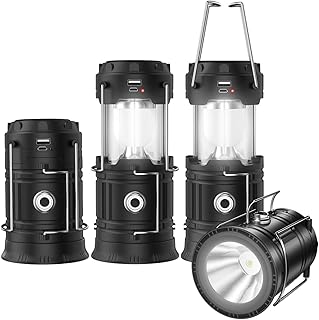
Pros and Cons
| Pros | Cons |
|---|---|
| Renewable energy source | Sunlight availability required |
| Environmentally friendly | Limited battery storage |
| Long-term cost savings | Initial investment in solar tech |
Emergency Food Supply Kit
Stocking up on non-perishable food items is critical in preparing for a potential food shortage. This emergency food supply kit contains a variety of long-lasting meals that can sustain you through challenging times. Check it out on Amazon.


Pros and Cons
| Pros | Cons |
|---|---|
| Long shelf life | Limited variety of meals |
| Easy storage and portability | Cost of the kit |
| Ready-to-eat meals | Risk of dependence on processed |
Water Filtration System
Access to clean water is just as crucial as food during a crisis. A water filtration system can purify contaminated water, ensuring a safe supply for drinking and cooking. Check it out on Amazon.


Pros and Cons
| Pros | Cons |
|---|---|
| Removes impurities and contaminants | Maintenance and filter replacement |
| Reliable source of clean water | Initial investment in the system |
| Reduces dependence on bottled water | Requires a power source |
Top Recommended Product for Food Shortage 2024
If you’re looking for the best solution to prepare for food shortage in 2024, we highly recommend the Emergency Food Supply Kit from Amazon. This kit provides a variety of long-lasting meals and is essential for stocking up on non-perishable food items. Ready to improve your preparedness for the potential food shortage? Check out the Emergency Food Supply Kit today for the best results!


Conclusion
The severity of the impending food crisis in 2024 cannot be overlooked. With the growing global population and the effects of climate change, the threat of food shortage is imminent and demands immediate attention.
Furthermore, it is crucial for global collaboration to take place in order to address the impending food shortage in 2024. Sustainable solutions must be implemented to ensure food security for all, and it is essential for governments, organizations, and individuals to work together towards this common goal.
The call to action is clear – we must come together to find sustainable solutions to address the food shortage in 2024. This requires proactive measures, innovative strategies, and a commitment to ensuring that everyone has access to an adequate food supply. It is only through global collaboration and collective efforts that we can effectively mitigate the impacts of the impending food crisis.

